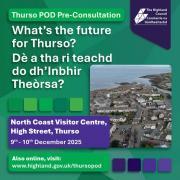Scottish Ward Boundaries And Councillor Numbers Under Review
25th February 2014
The Local Government Boundary Commission For Scotland have issued the following statem,ent regarding the latest review of boundaries and councillor numbers.
We started our Fifth Reviews of Electoral Arrangements on 21 February 2014. At the end of the Fifth Reviews we will make recommendations to Scottish Ministers for the number of councillors and the electoral ward boundaries in each of Scotland's 32 local authorities. We will be conducting the Fifth Reviews in two phases: firstly we will consult and decide on councillor numbers for each council; secondly we will consult and decide on ward boundaries.
We are required to conduct electoral reviews of each local authority at intervals of 8 to 12 years, as specified in the Local Government (Scotland) Act 1973.
The population, and hence the electorate, of any local authority area is constantly changing, with migration into or out of areas as well as within the same area. As a result of these changes, some councillors may be representing considerably more or fewer electors than their colleagues. These variations in levels of representation are one of the reasons that the legislation requires regular electoral reviews.
When reviewing electoral arrangements we are required to take account of the following factors:
the interests of effective and convenient local government;
within each council, each councillor should represent the same number of electors;
local ties which would be broken by making a particular boundary;
the desirability of fixing boundaries that are easily identifiable; and
special geographical considerations that may need different treatment.
Each ward must elect 3 or 4 councillors, and we design wards to match the number of councillors for each ward. We take into account the expected change in the number of electors in an area within the 5 years following the start of the reviews. We try to ensure that the number of councillors in each council area represent approximately the same number of electors.
We use a methodology to categorise council areas and determine council size. For the Fifth Reviews our methodology will be based on deprivation and population density. We are using deprivation as a factor in determining council size because we believe it is a reasonable indicator for a range of factors that impact on council services and on the work of councillors. Deprivation is also used by Scottish Government when making policy decisions.
For these reviews we have maintained the minimum number of councillors at 18, as we felt there was no necessity to change this. However we have extended the upper limit from 80 to 85. As we are using deprivation to determine councillor numbers, we felt there should be an increase in the number of councillors in Glasgow City council, which has high levels of deprivation. We are aware that a large change of councillor numbers in a council area can be disruptive, therefore we have incorporated a 10% change rule. This means that we will not increase or decrease the total number of councillors in a council area by more than 10%, as a consequence of any one review.
We expect to submit our recommendations to Ministers in 2016. The resulting wards will be available for the local government elections in May 2017.
Related Businesses
Related Articles
Exciting Career Opportunities With The Highland Council Now Open For Applications
# 10 December 2025 Career opportunities with The Highland Council The Highland Council is looking to fill a variety of posts relating to civil engineering and flood risk management based in locations across the area. Included are opportunities specifically for civil engineering graduates and technicians, providing the ideal job with career progression for anyone recently qualified and ready for a varied and interesting role.
What the NC500 Research Projects Are Designed to Do - and Why They Matter for the Highlands
As the North Coast 500 approaches its tenth anniversary, it has become one of Scotland's most well-known tourism success stories. The 516-mile loop around the far north of the Highlands has been celebrated internationally, marketed as a world-class road trip, and credited with transforming visitor numbers in some of Scotland’s most remote areas.Help Shape the Future of Thurso
The Highland Council is inviting people that live, work, or study in Thurso, to come along to the public consultation events to have their say. This is an opportunity to help shape the future of Thurso, to gather views and ideas.
Are Scottish Councils Quietly Reversing Outsourcing? A Look at Insourcing, Cuts and the Highland IT Shift
A notable article in the Guardian on 6 December 2025 noted the high sums being paid by London councils outsourcing services to private firms. The article starts with the reduction in council funding by UK government since 2010.Council welcomes Visitor Levy flexibility plan
The Highland Council welcomes moves by the Scottish Government to introduce greater flexibility on how it could design a Visitor Levy Scheme for consultation. The Visitor Levy (Scotland) Act 2024 currently provides local authorities with discretionary powers to implement percentage-based levies following statutory consultation.Highland Council is reaching out for views to shape its next 26/27 budget.
As it looks to set out its forthcoming priorities, the council is seeking involvement from members of the public, including businesses, community groups, parents, and young people. All their opinions are going to be crucial in deciding how Highland Council will take on its budget challenge for 2026-2027.Have your say in Thurso's future £100million investment by attending public consultation events
Thurso is to benefit from £100m investment in education and community facilities and are rolling out the first phase of public consultations on 9 and 10 December 2025. The Highland Council is inviting people that live, work, or study in Thurso, to come along to the public consultation events to have their say; this is an opportunity to help shape the future of Thurso, to gather views and ideas.Finding new owners for empty homes - Scheme launched to help return more empty homes to active use
A new online portal has been launched to bring empty homeowners together with prospective buyers or developers with the aim of facilitating more properties to be used as homes again. Covering the whole of Scotland, this builds on the success of local pilots, referred to as "matchmaker schemes".Consideration for short term let control area in Skye and Raasay
Steps towards introducing a short term let control area have been considered by Highland Council's Isle of Skye and Raasay area committee. On Monday (1 December 2025) the committee heard evidence to justify the grounds for the introduction of a Short Term Let Control Area covering all or part of Skye and Raasay.Workforce North event spotlights Highland economy
EMPLOYERS and educators from across the Highlands have gathered to hear how a new initiative is aiming to transform the region's economy. Workforce North - A Call to Action brought together business leaders and teachers from primary and secondary schools from across the Highland Council area with a wide range of partners geared towards education, learning and skills development at Strathpeffer Pavillion.
